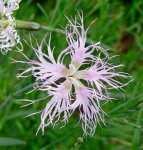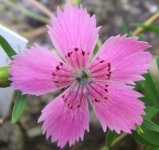Clove - dianthus l.
Family Carnations - Caryophyllaceae
Botanical characteristics. Perennial herbaceous plant. It grows everywhere.
Rhizome thin, creeping, with numerous subordinate roots. Stalk straight, thin. Leaves opposite. Fruit is a box. Seeds are numerous small. Blossoms in June - August. Fruits ripen in August - September. There are several species.
The most common are:
- Carnation lush - D. superbus L. Leaves linear-lanceolate. Flowers are purple, large. The petals of the corolla are deeply dissected into threadlike lobes. The stem is 15-50 cm high. It grows on dry and floodplain meadows, in sparse forests, on fringes.
- Carnation multicolored - D. versicolor Fisch. Leaves are narrow-linear to lanceolate-linear, on the tip very sharp, б.м. Pressed against the stem. Stems 20-40 cm tall, numerous thin. Flowers are mauve or light pink. It grows on stony slopes, in steppes, pine forests.
Both species are close in chemical composition, have healing properties, can be used with the same therapeutic purpose.
Used parts of the plant. Medicinal raw materials are all parts of the plant. Cloves are pulled out with a root during flowering and dried in the usual way in a shade or dryer at a temperature of no higher than 50 ° C.
Chemical composition. All parts contain: alkaloids, tannins: pyrocatechol derivatives; Flavonoids: orientin, homoirientine; The aerial part - saponins, flavonoids, vitamins.
Application. Carnation preparations are an effective uterine agent. They are used for atony of the uterus to stimulate childbirth, with postpartum haemorrhage.
The hypotensive effect of the clove extract was experimentally established. Materials of clinical trials make it possible to recommend galenic drugs for the complex treatment of essential hypertension. Decoction and infusion - hemostatic, with gastrointestinal and uterine bleeding, with nervous diseases.
In folk medicine , decoctions and infusions of cloves are used as a remedy against intoxication, with heart diseases, bites of rabid animals and insects; With cramps in children.
Flowers and fresh juice plants are used to treat hemorrhoids, kidney disease, liver, lungs, the effects of unfavorable births, syphilis. Otrarly broths and infusions of seeds and flowers are used for dermatitis, for flushing sore eyes.
In Tibetan medicine, carnation drugs are used for various gynecological diseases, in large doses as abortive; In the collections - as wound-healing agent.
In China and Japan, a lush carnation is used for bladder diseases, dysmenorrhea, schistomatosis, as a diuretic and anti-inflammatory.
In Yakutia, the decoction of the aboveground part of the plant is drunk when coughing, aches in joints.
Preparation
- For infusion take 20 g aboveground part of the plant, pour 200 ml of boiling water, insist on a boiling water bath for 15 minutes, cool 45 minutes, filter. Take should be 1/3 cup 2-3 times daily before meals.
- For the decoction of 10 g seeds pour 200 ml of boiling water, insist on a boiling water bath for 30 minutes, cool for 10 minutes, filter. Take 2 tbsp. Spoon 3 times daily before meals.
- Tincture from the roots is prepared on 70% alcohol at a rate of 1: 5, insist 10-12 days in a dark place. Take 30-40 drops at the reception before meals.
- Fresh juice of the plant take 1 tsp 3-4 times a day before meals. For external use it is necessary to plant (1: 2); To wash the eyes, dilute the juice 1:10.




Comments
When commenting on, remember that the content and tone of your message can hurt the feelings of real people, show respect and tolerance to your interlocutors even if you do not share their opinion, your behavior in the conditions of freedom of expression and anonymity provided by the Internet, changes Not only virtual, but also the real world. All comments are hidden from the index, spam is controlled.